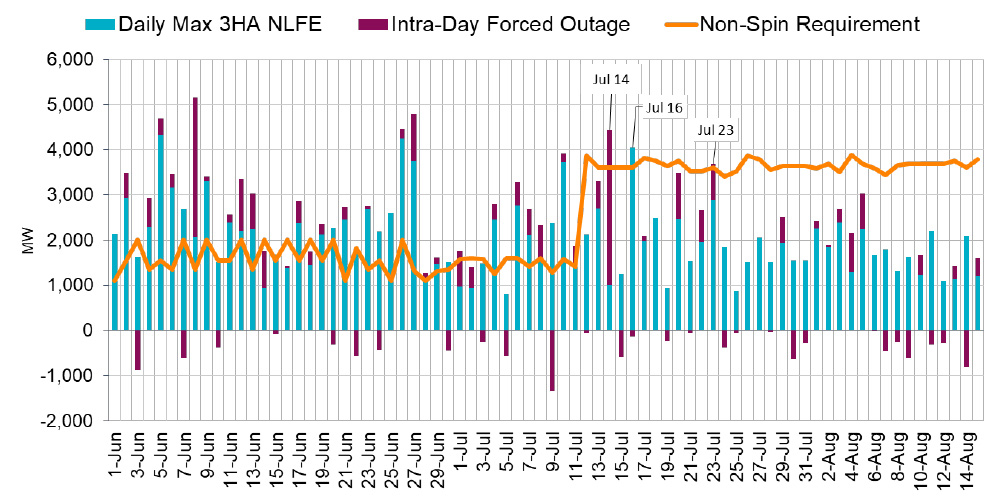Staff Says Conservative Operations to Continue into 2022
ERCOT staff told stakeholders Friday that they plan to continue into next year their conservative operations approach of setting aside additional reserves through ancillary services procurement.
Since July, the grid operator has been setting aside at least 6.5 GW of operating reserves by more than doubling amounts of ancillary services, with the costs uplifted to load. The objective is to prevent a repeat of June’s call for conservation that spooked Texas consumers with long memories of Winter Storm Uri in February. (See ERCOT Stakeholders Sign Off on More Ancillary Services.)
“You will see us procuring more additional reserves than we have in the past. How we go about that is where we’re looking at making changes,” Jeff Billo, director of forecasting and ancillary services, told the Technical Advisory Committee during its regular monthly meeting.
Staff has increased responsive reserve service procurement from 2.3 GW to 2.8 GW during peak load hours on all days and upped non-spinning reserve service to ensure 6.5 GW of ancillary services is maintained for all hours of all days. Starting Sept. 1, the grid operator will add up to 1 GW of non-spin for hours when there’s a higher potential of weather forecast uncertainty, rather than for all 24 hours.
ERCOT normally reports its ancillary service plans for the upcoming calendar year in January. Until then, Billo said, staff will be working on “more precise calculations” for what the grid operator needs and has already begun discussions with stakeholder groups.
“There’s support for being more conservative, but we think there are ways to finetune that,” Reliant Energy Retail Services’ Bill Barnes said.
Based on stakeholder suggestions, ERCOT is looking at changes necessary to allow non-controllable load resources to participate in non-spin services. Stakeholders have also suggested load resources not be excluded from reserve calculations and that staff consider modifying the day-ahead process to eliminate voluntary participation.

Members still disagree with the continued use of reliability unit commitment (RUC) and the amount of capacity it commits. Billo noted RUCs have been reduced since the ancillary services changes in July.
“The [Public Utility] Commission has been talking about how to create an efficient market, and we’re happy to work with stakeholders on that,” Billo said.
“I think you’re hearing near-unanimous concern about the RUC part of this process, which has major impacts on reliability and the market,” Barnes said. “You’ve got stakeholder support for part of what you’re doing, but the additional RUC process doesn’t make sense.”
Barnes called ERCOT’s use of RUCs an “outdated perspective,” given the 1 GW of battery storage that has been added to the system.
“Batteries will solve the RUC problem,” he said. “The time of long-lead time, inefficient gas plants to solve our problem is over. I think we’re in a different system.”
“If you look at the amount of batteries currently on the system, we’re not there yet,” Kenan Ögelman, ERCOT’s vice president of commercial operations, responded. “If they were there and we were able to dispatch them across the challenging intervals we see, we wouldn’t have to RUC. That part is a self-correcting issue, but we’re not there yet.”
TAC Structural/Procedural Review
The committee will conduct its annual structural and procedural internal review in September, which should not be confused with interim CEO Brad Jones’ plan to transition to a senior-level group with representatives from each member organization, said TAC Chair Clif Lange, with South Texas Electric Cooperative.
Lange called the review a “self-reflective exercise.” The review could lead to some of the same stakeholder discussion that dominated The TAC’s July meeting with Jones. (See ERCOT Technical Advisory Committee Briefs: July 28, 2021.)
Real-time Co-optimization Group Retired
Members approved staff’s request to retire the Real-time Co-optimization (RTC) Task Force following their last update on the Passport Program, which bundled together RTC and several other high-profile initiatives. Much of that work has been delayed by staff’s focus on implementing numerous upcoming Uri-related changes. (See “Passport Program ‘Uncoupled,’” ERCOT Board of Directors Briefs: Aug. 10, 2021.)
Passport Program director Matt Mereness said the stakeholder group has completed its deliverables, which include establishing policy principles for implemented RTC and drafting seven protocol changes. The market tool clears energy and ancillary services every five minutes in the real-time market, but it is not expected to come online until 2025 at the earliest.
Future status updates on Passport’s projects will be done as part of ERCOT’s regular portfolio management updates.
Southern Cross Directive Passes
TAC unanimously approved the combination ballot, which included added language to the committee’s procedures that formalize remote participation in meetings and NRG Energy’s request for a permanent exemption from ERCOT metering requirements for its coal-fired Limestone Generating Station.
The ballot also included a system change request and single revisions to the nodal operating guide (NOGRR), retail market guide (RMGRR) and the resource registration glossary (RRGRR):
- NOGRR227: allows for single phase current magnitude/angle data for an interconnected intermittent renewable resource (IRR) over 20 MVA to be taken from either side of the main power transformer where turbines exist on feeders that are aggregated to two or more IRRs.
- RMGRR167: clarifies current documentation required for a successful submission requesting removal of a switch hold due to a deferred payment plan or tampering.
- RRGRR031: amends the glossary to accommodate registration of settlement-only energy storage systems to require the same level of registration detail required for energy storage resources under RRGRR023.
- SCR813: modifies the network model management system to highlight change submissions related to jointly-rated equipment, listing other entities that have also provided ratings. The submitter will be asked to confirm that the requested changes have been coordinated with the associated companies.
TAC endorsed SCR814 separately, with Luminant and Calpine abstaining. The measure introduces a limit on the total number of point-to-point obligation bid intervals that can be submitted into the day-ahead market per counterparty.




